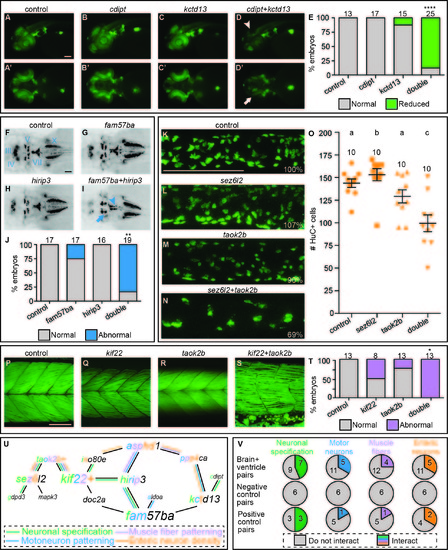
Interacting pairs affect multiple phenotypes in secondary screen. One example of an interacting pair for each of the secondary screen assays. The rest of the interacting pairs are not shown. To evaluate neuronal specification, single and double LOF was induced by injection of MOs into a transgenic NeuroD:GFP line. A-C) Control and single cdipt and kctd13 LOF lateral views exhibit normal levels of NeuroD:GFP expression. A'-C') Ventral views of same embryos. D) Lateral view of double LOF embryo shows reduced expression in the optic tectum (arrowhead). D') Ventral view of double LOF embryo shows reduced expression in the retinal ganglion cells (arrow). E) Percent of embryos with normal (gray bars) and reduced (green bars) expression is quantified with total number of embryos scored above the bars. We analyzed cranial motor neuron patterning using the transgenic islet1:GFP line. F-H) Dorsal views of 2 dpf control and fam57ba and hirip3 single LOF fish exhibit normal patterning of cranial motor neurons in islet1:GFP embryos. I) Double LOF embryos show reduced trigeminal (V, arrow) nerves in the medial-lateral direction, and a misshapen facial (VII, arrowhead) nerve. J) Percent of larvae showing normal (gray) versus abnormal (blue) cranial motor neuron patterning quantified, with total number of larvae imaged shown above each bar. We examined enteric neuron density by antibody staining for the neuronal marker HuC. HuC positive cells were counted in 3D reconstructions of the midintestine at 5 dpf. K-M) Control and sez6l2 and taok2b single LOF images of HuC positive cells in the mid-intestine, with percentages of cells relative to control shown in bottom right corners. N) Double LOF larvae show reduced enteric neuron density. O) Quantification of number of enteric neurons, with each orange point representing a single larva, and total number of larvae assayed above each group. Different letters above each treatment indicate a statistically significant difference of p<0.05 as measured by t-test (Mann-Whitney). Error bars show standard error. We evaluated muscle fiber patterning by phalloidin staining at 5 dpf. Q-R) Single LOF for kif22 and taok2b resemble the control. S) Double LOF larvae show an interaction where muscle fibers are no longer neatly arrayed into chevron shaped segments and instead show looser packing with some fibers crossing muscle boundaries. T) Percent of larvae showing normal (gray) versus abnormal (red) muscle fiber quantified, with total number of larvae imaged shown above each bar. U) Brain and ventricle interaction map overlaid with interactions from secondary screen, lines color coded for each assay, and letters colored in gene names for number of interactions for each assay. V) Number of pairs that interacted in brain and ventricle primary screen interacting in each of secondary assays (top row), negative control pairs (middle row), and positive control pairs (bottom row). *p<0.005, **p<0.0001, ****p<1x10-15. Scale bars=100 um.
|

